"caring for cats"

Feline Dental Disease
By Jonathan Frost BVSc MRCVS. Veterinary Dentist

Common dental diseases found in cats
Dental issues in cats is sadly a commonly overlooked complaint in cats, despite the estimate that around 85% of cats over 3 years old have some form of dental disease. Unfortunately cats are incredibly good at masking pain and discomfort, so problems are often not detected until they have worsened severely. Many of these diseases can be slowed or even stopped if identified and correctly managed at an early stage.
A healthy adult cat should have 30 teeth, which have evolved for hunting and killing small prey with their canine teeth, and then “chopping” the prey into chunks which can be swallowed whole. Modern diets (both wet and dry) have reduced the need for these functions, which means that cats missing teeth can cope very well.
How do I know if my cat’s mouth is painful?
Oral pain symptoms can be vague and, as we said, cats are very good at masking the symptoms. Some cats will carry on eating and playing and not showing any signs, even though they could have a very unpleasant mouth.
Other cats will show a reluctance to eat hard biscuits, or will preferentially eat on one side of the mouth. Sometimes you will notice your cat dropping food. A cat struggling to eat will lose weight and body condition.
Other signs of oral pain can include a change in the ability to groom, resulting in an unkempt or matted coat. You may also see excessive dribbling or notice an abnormal smell.
Any time your cat is showing you something new or unusual, it would be recommended that you take them to a vet, just to check that they aren’t suffering.
Gingivitis and periodontal disease
Gingivitis is one of the most common issues seen in cat’s mouths, and is a reactive process where the gums get red and inflamed due to contact with plaque bacteria sitting on the teeth. Gingivitis is reversible if you can remove the plaque bacteria and keep the teeth clean.
If gingivitis is left to worsen, the inflammation can track down to the bone and periodontal ligaments which keep the teeth in place, causing them to be eroded. This process is called periodontal disease, and 15% of cats in the UK are diagnosed with it annually. This is an irreversible condition which can be painful and result in teeth needing to be extracted.
If your cats gums look red, then they should have a full assessment by your vet, which may include cleaning the teeth and taking x-rays to assess the extend of the problem. The below images were from the same cat, showing the redness of the gums, but the x-ray showing significant bone loss. Sadly this cat needed all 3 of these premolars extracting, which massively improved it’s quality of life.
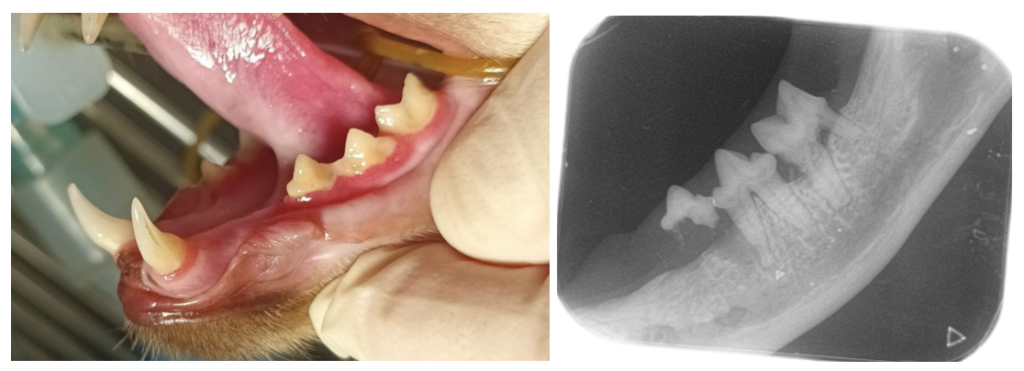
Tooth resorption
Tooth resorption is a process by which the dentin (a hard tissue that lies beneath the enamel of the tooth) in a tooth erodes and eventually becomes irreparably destroyed. Over time, all areas of an affected tooth may become involved.
It is a painful condition. Even if your cat is still bright and eating well, they could be hurting.
We still do not know a definitive reason why some cats develop resorption and others don’t. In one study, 53% of cats had an obvious tooth resorption lesion, and almost 50% of the time where no obvious lesion was noted clinically, X-rays revealed one. The Xray below shows the destruction of the crown and roots due to resorption.
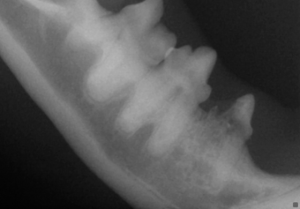
There are 2 types of resorption in cats, which can be differentiated by your vet taking dental radiographs. The treatment is removing the affected tooth.
Broken teeth
Sadly it is not uncommon for cats to fracture their canines, usually due to trauma such as a car accident, fighting other cats or misjudging a jump.
The damage to the tooth exposes the pulp cavity inside the tooth, which contains the blood vessels and nerves. This is acutely painful but can mean that as the pulp dies off then bacteria can travel through the broken tooth into the bone of the jaw, resulting in tooth root abscesses.
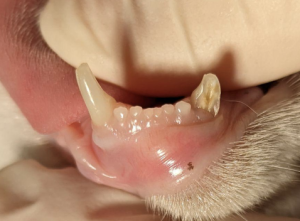
Depending on the state of the tooth, treatment options can include surgical extraction to remove the damaged tooth, or root canal therapy to try and save the bulk of the tooth and the function.
Gingivostomatitis
Gingivostomatitis is a chronic, debilitating inflammatory disorder that affects the gingiva (gums) and other areas of the mouth. This is an intensely painful condition, and the causes of it are not yet fully understood.
It is thought to affect under 1% of cats but can be really unpleasant for them.
It is best diagnosed by your vet taking a biopsy.
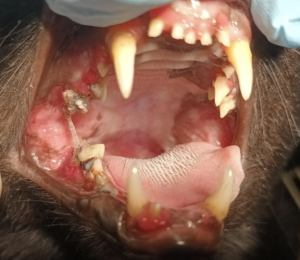
Treatment options can include pain relief and medication to suppress the immune system, but it is not uncommon for a cat to need major surgery to extract the majority of their teeth. While this sounds drastic, it makes a massive difference to the cat’s well-being and quality of life.
At the end of the day, there are many more diseases and conditions in cats’ mouths which can cause pain, discomfort or negatively affect their quality of life. Your cat cannot tell you when something isn’t right, and it is up to us, as owners, to recognise when they aren’t happy.
If something doesn’t seem right with your cat, the best thing to do would be to have your vet take a look. They may choose, with your agreement, to have a further look under anaesthetic and take some x-rays to help assess the problems and to help you make an informed decision as to how to help your feline companion.
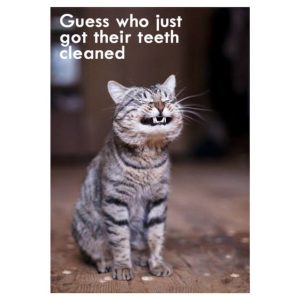
Feline Ailments
" I had been told that the training procedure with cats was difficult. It’s not. Mine had me trained in two days"
Bill Dana

 menu
menu